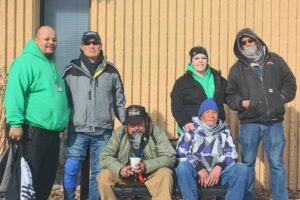Houseless and hungry
Houseless and hungry
By Clara Caufield,
NSNT Staff Writer
Part IV
RAPID CITY – What normally happens to a homeless person who is drunk, passed out and in danger of freezing to death in a big city? If they are lucky, somebody will notice and call the cops. Going to jail (Three hots and a cot as that is jokingly called) is then better than going to the morgue. But now, in Rapid City, South Dakota, many people who get into that jackpot can expect better – Journey On! Street outreach workers who may very well come to the rescue and provide better alternative.
Street outreach to the Houseless and Hungry in Rapid City is but one component of the activities in Rapid City conducted by Journey On!, an organization dedicated to helping the houseless and homeless population, primarily Native Americans. The majority of that population are Oglala Sioux, but there are also Natives from other Tribes and non-Indians in that group, estimated to be about 17,000 people. This article focuses on the street outreach conducted by Journey On! which is in part funded by the City to assist the Rapid City Police Department with calls related to public intoxication, welfare checks and other needs of at risk vulnerable people.
As reported by Rich Braunstein, Journey On! Street Outreach Director, in one week alone (January 17-22, 2022) their Street Team responded to 71 referred calls from the Rapid City Police Dispatch service to assist unsheltered people in need. That represented about 60% of such calls made to Rapid City Law Enforcement or to “911”. The Journey On! Intercession is an alternative to police responses for public intoxication, vagrancy, trespassing, etc., reducing the use of “system” resources (booking, jail time, time of officers etc.).
The Journey On! Street Outreach program is a new undertaking with Rapid City, a development springing from many community-based initiatives beginning some years ago. In 2018 a representative from the Newark Community Street Team from Newark, New Jersey visited Rapid City, meeting with the Collective Healing Initiative (CHI) a local group investigating ways to heal relationships between the Rapid City Native American community and the Rapid City Police Department. CHI included tribal elders, community members and others from organizations providing leadership in the community. CHI held 22 meetings over two years which resulted in 24 specific recommendations on how to heal the strained relationship between the Native Community and Police Department. Aqeela Sherrills from the Newark program shared a model of how marginalized communities can take care of themselves, a model which CHI recommended and the City of Rapid has since incorporated.
Rapid City’s CHI was awarded one of five such grants nationwide from the Department of Justice, Office of Victims of Crime to conduct demonstration projects for that effort, Rapid City the only one focusing on a Native population. The project was based on recommendations formerly made by the CHI to the Rapid City Police Department on how to develop better trust relationships and generate better services for the houseless and hungry folks in those confines. Key recommendations included: training for officers on historical trauma; Native-led street outreach, and programs supporting Native youth, Braunstein explained.
Currently Journey On!, a nonprofit has several sources of funding: a federal grant, Emergency Solutions, (one of several in Rapid City) from HUD; a contract of $150,000 with Rapid City for outreach referred by City Police dispatch; foundation grants and private donations. Recently they have established a “Go Fund Me” page for private donations accessible at gofund.me/03fb7ba9. “Every contribution goes to direct services” according to Braunstein. “We do not have administrative overhead.”
Rapid City Council member, Lance Lehmann, member of the Rosebud Sioux Tribe and President of the Rapid City Common Council was instrumental in getting the City appropriation, although he abstained from the vote as he serves on the Journey On! Board of Directors, a nonpaid position. “This is a wonderful investment to meet a difficult challenge, a small one to get positive results,” he said. (In a future issue look for a profile story about Lehmann, the only Native currently serving on the Rapid City Common Council).
“We are funding Journey On! and Volunteers of America out of general fund dollars. We are hoping to find two other nonprofits (with similar missions) with grant dollars. This is a dedicated effort to provide better outreach and assistance to members of the houseless community, and also to reduce the call for service load on the police department,” said Mayor Allender.
Though Journey On! does actually has administrative costs, they are covered largely by the University of South Dakota (USD). Among other things USD provides work release for Professor Braunstein’s time spent with Journey On! and other Rapid City civic organizations. This relieves Journey On! From having to pay a program administrator, funds data management, copies and other administrative expenses.
(Clara Caufield can be reached at acheyennevoice@gmail.com)
The post Houseless and hungry first appeared on Native Sun News Today.

